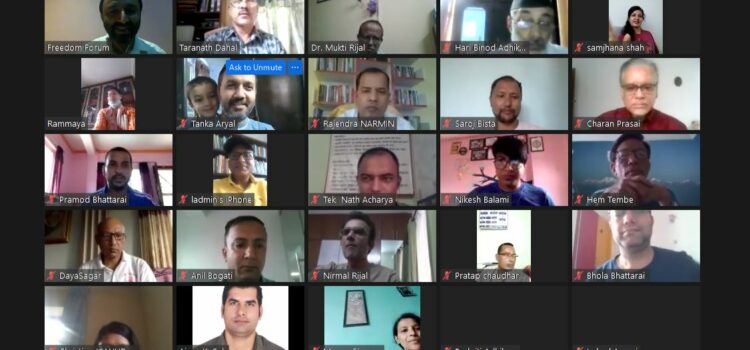Freedom Forum organized a virtual discussion on ‘Citizen Engagement at Local Governance’ as part of the thematic discussion series of Open Government Partnership on October 5. The discussion dwelt on existing citizen engagement mechanism and practices at the local level mainly in law-making, planning, and budgeting process. The participants included CSOs working with local governments, local level representatives, and experts. They stressed the need of reforms and willingness to get engaged from the citizen for the improvement at local government.
On the occasion, governance expert Dr. Mukti Rijal presented a working paper on ‘Citizen Engagement for Local Government’ and brought to light the trust deficit among the local government and CSOs, opposition and citizen. He argued all institutional and individual are highly politicized, which could create problems to the representative and the local level government. The oversight mechanism, he said, is imperative at local level. His focus was review in institutional ecology and need of holistic discourse.
Team leader at CECI Hem Tembe viewed that collaboration between government and citizen in the process of policy making was essential. He expressed worry that participation was basically taken as tokenism. The participation should be defined through planning, advocacy and lobbying with government as well as among the stakeholders. There is important role of citizens to bring reform in public body and local government which, he argued, would result in betterment of the individual, society and nation. Not mere participation but meaningful engagement is need of hour, according to him.
Executive Director at Young Innovation Bibhusan Bista viewed one-size-fits-all may not be a solution to the problems of heterogeneous community.
Anirudra Neupane from Committed Nepal pointed out the need of capacity building of people so that they would have meaningful engagement at local levels. He suggested CSO and the media to play the role of opposition.
Policy Advisor at FF Krishna Sapkota stressed the citizen engagement of underrepresented communities needs to be the matter of discussion. Those who have less say should be put at the center, he added.
In view of Dayasagar Shrestha and Charan Prasai, inclusive and participatory engagement among citizens and government could better governance. Prasai however stated that the citizens and government are somehow confused in their role and they think election is the only way of collaboration, which, he said, is wrong. Prasai accused the government is guided more with vested interests than the engagement with the public.
Krishna Pathak from USAID informed the MOFAGA has developed a civic engagement framework where civic engagement principles, anticipated results and methods are well articulated. This may help us take civic engagement on a larger scale.
Chief Executive at FF Taranath Dahal underscored that the local governance should be transparent where partnership should be made to identify gaps, draft and laws and regulation. The political atmosphere has forced us to collaborate with stakeholders together and work in the concerned issues, he said, adding that the policy of local governance has somehow overlapped the space of CSO.
Sajana Maharjan from The Asia Foundation expressed that as per OGP there should be collaboration between government and citizens on identifying and solving problem on policy- planning-development and sharing contribution and benefits.
The virtual meeting was moderated by Sanjeeb Ghimire. Out of 66 participants, there were 20 females in the event.

